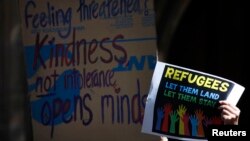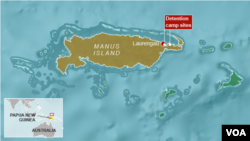Investors in the company that runs Australia's secretive refugee camps are starting to flex their muscles in a way that may achieve what refugee advocates and politicians have failed to for years – greater transparency and oversight.
Australia's offshore immigration detention system, which involves intercepting refugee boat arrivals and processing applications for protection visas on islands outside the migration zone, has earned the criticism of the United Nations because of near-nonexistent access for outside observers.
Transfield Services Ltd., which operates the camps, told local media it would consider taking fund managers to its centers on the Pacific island nation of Nauru and Papua New Guinea's Manus Island – an offer that activist groups say they have been denied since 2012.
"Sure, we can go, we will go," Simon Mawhinney, managing director of Australian fund manager Allan Gray Australia Pty. Ltd., told Reuters on Monday. "But it's important for other people to go and for us to seek their advice and counsel upon their return, because they're the ones who know more."
Human rights
Mawhinney told Reuters his firm plans to use its position as Transfield's biggest shareholder to fight for better access for human rights groups.
Transfield has faced an especially harsh backlash since taking the contract to run the Manus center in 2014, including being forced to cancel its sponsorship of the Sydney Biennale when artists refused to participate because of its involvement.
Allegations of detainee abuse prompted Australian health industry-focused HESTA Super Fund to dump its 5 percent Transfield stake last month.
HESTA Super Fund said it sold its stake because the "mandatory, prolonged, indefinite, and non-reviewable nature of detention at asylum seeker processing centers breaches the fundamental principles of international human rights law."
Australian teacher pension fund NGS Super said it was selling its Transfield shares on "moral grounds."
Transfield said on Monday it expects the immigration department to renew its A$1.2 billion ($849.48 million) detention center deal for five years. Its current 20-month contract expires on Oct 31.
A Transfield spokesman said while the company is the preferred contractor, it hasn't signed a new contract, and it would be inappropriate to comment on future plans.
Naru detention center
An Australian Senate committee meanwhile recommended speeding up the removal of asylum seeker children and their families from the Nauru detention center, saying it was "not adequate, appropriate or safe," and demanding an audit of allegations of sexual abuse.
It also recommended more access for journalists and rights groups.
Shares in Transfield have fallen 34 percent so far this year. They closed more than 7 percent lower on Tuesday.
The pressure on Transfield suggests refugee treatment will be the next battlefront in the conflict between companies in ethically ambivalent industries and shareholder activists.
Allegations of detainee abuse have also generated talk of possible legal retribution, though any legal backlash will not directly affect shareholders.
"It's one of the basic principles of corporate law that the company's liabilities don't become the shareholder's liabilities," said Professor Stephen Bottomley, dean of law at Australian National University in Canberra.
"Shareholders are liable only to pay any money they owe on their shares. The only impact they feel from the company's wrongdoing is through a drop in share value."
Better information
Australian Shareholders' Association Chair Diana D'Ambra said she expects Allan Gray's pressure on Transfield to force the company to disclose better information at least.
"It may well be that this sort of thing will become more front of mind for fund managers, and that's a good thing," she added.
Transfield Services was previously part of privately held Transfield Holdings founded by two Italian immigrants.
Transfield Holdings said in September last year it had sold its entire stake in the services company.







